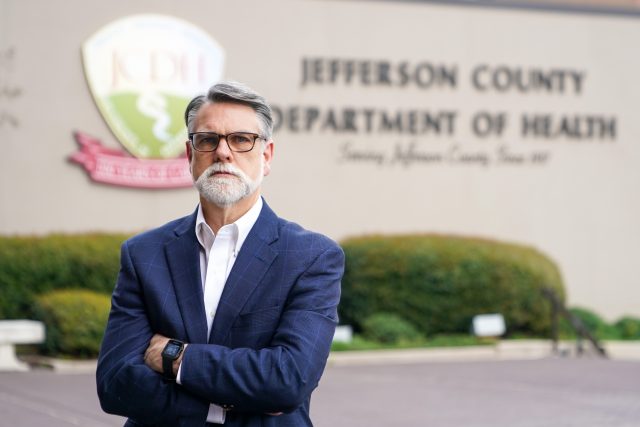By Michael Tomberlin
Alabama Newscenter
Jefferson County Health Officer Dr. Mark Wilson is urging the public to continue to limit gatherings — including at churches –to 10 people or less, despite plans by Gov. Kay Ivey and the Alabama Department of Public Health to lift the restrictions starting May 11.
“I am very, very concerned about the fact that we do not have decreasing instances of disease in the community. COVID-19 is still with us, it’s still quite steady and we’re still seeing a lot of it in the community,” Wilson said. “So, this relaxing of orders, while I believe it was a decision that had to be made because we need to get back to business, the economy is really suffering, people need to get back to work; I am going to issue a strong recommendation – this is not an order, we’re not telling people what they have to do – … but I am going to recommend that in Jefferson County people refrain from having public gatherings of greater than 10 people, including worship services, for at least another two weeks after this weekend – until we see the effect of this new order.”
Wilson and Dr. Jeanne Marrazzo, division director of infectious diseases at UAB, spoke to reporters as part of the Jefferson County Unified Command following Ivey’s press conference Friday morning where she announced she has amended her Safer at Home order to allow for the opening of restaurants, hair salons, gyms and fitness centers beginning May 11. The amended order also drops the requirement to limit public gatherings to 10 people or less, allowing for churches and other houses of worship to resume services.
Both Wilson and Marrazzo expressed concern that any attempt to return to dense gatherings too soon could result in a new spike in COVID-19 cases that would undo gains made to control the spread of the coronavirus in the state.
Marrazzo said social distancing, handwashing, limiting public outings and other measures have proven to help control the spread of COVID-19.
“I think the huge concern right now for us is that with this opening, if people don’t continue to take this evidence forward, we’re going to backslide,” she said. “All of the gains that we’ve made in the last two months of extreme sacrifice could be lost very quickly.”
Wilson said he wishes rules and orders were not needed.
“I would really like to get away from focusing as much on rules and helping everybody understand how the virus is spread, how we all have to take responsibility to prevent the spread to protect ourselves and protect others,” he said. “And if we can all really do that well, then we don’t need to worry about having all of these rules and things.”
That includes continuing to do the things that have proven to work, such as wearing face coverings, maintaining at least six feet of separation and the like. Marrazzo said about half of the COVID-19 infections are believed to be transmitted before the carrier is showing any symptoms and that can be for five days.
“How much longer are we going to have to do this? I think we’re going to have to do some variation of this until we get a vaccine,” she said.
Wilson said just because the governor is lifting restrictions does not mean everyone needs to suddenly run out to restaurants, salons, gyms and churches.
“I want everybody to keep in mind that just because you’re allowed to do something, it’s not necessarily the right thing or the smart thing to do,” he said.
That being said, Wilson and Marrazzo said they understand the toll this is taking on people.
“I think that we all recognize that this has been an incredibly painful sacrifice – at the personal level, at the spiritual level for people who are missing their places of worship, and certainly at the economic level,” Marrazzo said. “I think everybody is feeling a lot of pain and it’s really hitting close to home. That said, getting our activities back to normal really has to be done with excessive caution.”
Wilson sympathized with the governor making the difficult decision to balance the economic needs with the health needs, saying his own decision to force businesses to close early on in the pandemic was personally painful.
“It’s a tough decision to make and I’m very sensitive to the economic issues,” he said.
But, he added, he understands that things can’t remain shut down indefinitely.
“I think I can safely say that this new step that we’re taking does make me nervous,” he said. “I don’t think there is any way to avoid that, though. We have to eventually open business back up and if it were now or if it were three months from now, I would still be nervous about it.”




